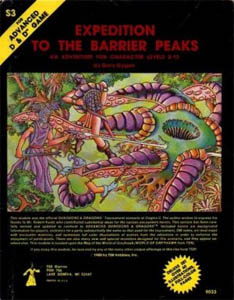The Clean Slate - stuff to remember when playing with kids, parents, and other newbies
Every newbie DM makes mistakes, and even the veteran DM running for a new game group is going to put their foot into it sometimes. But there are even more mistakes that can be made when trying to corral together a disparate group of misfits and ne'e-do-wells (ie your own family) and get them engaged in a fantastic world.Believe me, I should now.
Fortunately, the sword in this instance is very much double-edged:
The Positive
1) The wonder of it all - The first time a skeleton comes alive and swings a rusty scimitar, your players will be scared. The first time a fat and hairy giant spider drops from the webs onto their face, they will be terrified. The first time they open a treasure chest and count out 100 silver pieces, they will feel rich. Embrace all this.| Remember, to most people in the real world, the idea of the dead coming to life is actually terrifying. |
2) They don't read modules at bedtime - They don't know that Expedition to Barrier Peaks involves a crashed spaceship (er, sorry - spoiler alert there). They don't know the drow are the major force behind the giants. They haven't flicked through the latest Wizards or Paizo adventure path just to see what's in it. Don't use these products as written (too complicate - see below). But certainly steal all the best ideas and mash them into a simplified adventure
 |
| Spoiler, this module also involves you getting attacked by a plant thingy |
3) It's only game - Your players will equate gaming to fun and expect to have fun around the table. That in itself is a good start.
They shouldn't get into tedious arguments about rules lawyering or interpretation of area effects. Because they don't actually know the rules. And you can bring in any house rules you want. Just be sure to keep the game light, positive, and empower the players by taking on board their ideas. If a PC wants to use a pot of melted cheese to make a spider too gunky to climb through its webs, go for it.
The Negative
1) Time is of the essence - Most family board games take half an hour, or an hour tops. Even the more in-depth games can be done in an evening. Dnd can theoretically go on forever. Don't let it. People will be overwhelmed, they will get tired. I'd plan for 90 minutes at first. That is VERY short when it comes to Dnd so you'll have to really move fast to get in two encounters. You can have a spare encounter on standby if things are moving fast, or if people are really getting into it.Believe me, that will be enough. I've tried to cram four encounters into an evening and it ended up running almost four hours. That's fine for a RPG group but it gets far too long and drawn-out for most casual gamers.
2) What the heck are you talking about? - Your players will not have watched every fantasy film or game show, played every RPG video game or read every Dnd novel. In fact they have probably done none of the above, being more interested in kids cartoons, reality TV, or gardening shows, depending on their age. So they won't necessarily recognise the meaning of words like sage, scimitar, wight, rogue, caltrop, barding, stave, or electrum. That's just the basic vocabulary.
You cannot tell them they're in Waterdeep and expect them to picture the City of Splendors. You have to work hard to paint that picture.
You can't describe a monstrous, bulbous creature with one central eye and several twisting eye stalks floating eerily towards them and expect them to scream 'BEHOLDER!' and run away. They might try to pet it, or think it's some kind of mook.
They won't get the in jokes, so don't bother making any. But at least everything will seem new, wondrous and fresh (see above)
| Well, he MIGHT be a friendly one ... |
3) I'm confused...! There will be a player who doesn't understand how attack and damage dice differ. There will be a player who doesn't understand how ability scores translate into ability modifiers. There will be a player who doesn't understand how the Vancian spell system works (and they won't be alone). So you'll need to stop and explain. You'll need to take things very slow and help them understand.
The best tip I can give here is to keep the rest of the moving parts simple. Keep NPCs to a minimum. Two per adventure is grand. Keep the monsters basic - something with one attack like a goblin swinging a sword. If a fight is dragging on to long, then reduce the enemy's hit points and get through it quicker.
And remember the goldern rule: have fun!
You can now follow me on Twitter @Awakenedshrub to see all my musings in shorty form.
No comments:
Post a Comment